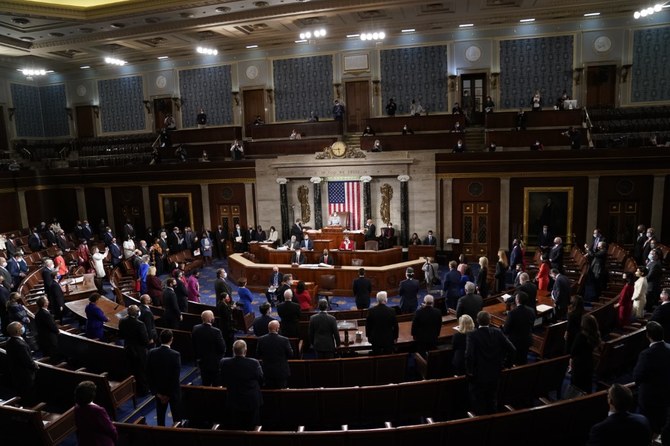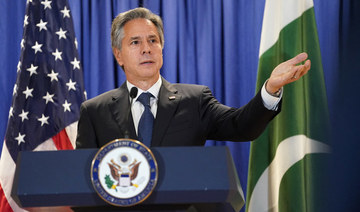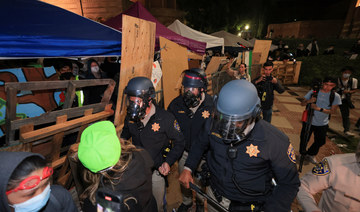WASHINGTON: The US Senate on Thursday passed bipartisan legislation backed by President Joe Biden that lifts the government’s $31.4 trillion debt ceiling, averting what would have been a first-ever default.
The Senate voted 63-36 to approve the bill that had been passed on Wednesday by the House of Representatives, as lawmakers raced against the clock following months of partisan bickering between Democrats and Republicans.
The Treasury Department had warned it would be unable to pay all its bills on June 5 if Congress failed to act by then.
“We are avoiding default tonight,” Senate Majority Leader Chuck Schumer said on Thursday as he steered the legislation through his 100-member chamber.
Biden praised Congress’ timely action. “This bipartisan agreement is a big win for our economy and the American people,” the Democratic president said in a statement, adding that he will sign it into law as soon as possible. He said he would make an additional statement on Friday at 7 PM
Biden was directly involved in negotiations on the bill with House Speaker Kevin McCarthy.
While this bitter battle has ended, Senate Republican Leader Mitch McConnell wasted no time flagging the next budget fight.
“In the coming months, Senate Republicans will continue working to provide for the common defense and control Washington Democrats’ reckless spending,” he said in a statement.
McConnell was referring to 12 bills Congress will work on over the summer to fund government programs in the fiscal year beginning Oct. 1, which will also carry out the broad instructions of the debt limit bill.
Treasury Secretary Janet Yellen, meanwhile, issued some pointed advice saying, “I continue to strongly believe that the full faith and credit of the United States must never be used as a bargaining chip,” as Republicans did over the past several months.
Before the final vote, senators tore through nearly a dozen amendments — rejecting all of them during a late-night session in anticipation of Monday’s deadline.
With this legislation, the statutory limit on federal borrowing will be suspended until Jan. 1, 2025. Unlike most other developed countries, the United States limits the amount of debt the government can borrow, regardless of any spending allocated by the legislature.
“America can breathe a sigh of relief,” Schumer said in remarks to the Senate.
’TIME IS A LUXURY’
Republicans had blocked passage of any debt limit increase until they locked in some wide-ranging spending cuts in a move they said would begin addressing a rapidly escalating national debt.
Biden instead pushed for tax increases on the wealthy and corporations to help address the growing debt. Republicans refused to consider any sort of tax hikes.
Both parties walled off the sprawling Social Security and Medicare retirement and health care programs from cuts, and McCarthy refused to consider reducing spending on the military or veterans.
That left a somewhat narrow band of domestic “discretionary” programs to bear the brunt of spending cuts. In the end, Republicans won about $1.5 trillion in reductions over 10 years, which may or may not be fully realized. Their opening bid was for $4.8 trillion in savings over a decade.
Treasury technically hit its limit on borrowing in January. Since then it has been using “extraordinary measures” to patch together the money needed to pay the government’s bills.
Biden, Yellen and congressional leaders all acknowledged that triggering a default for lack of funds would have serious ramifications. Those included sending shock waves through global financial markets, possibly triggering job losses and a recession in the United States and raising families’ interest rates on everything from home mortgages to credit card debt.
The Republican-controlled House passed the bill on Wednesday evening in a 314-117 vote. Most of those who voted against the bill were Republicans.
“Time is a luxury the Senate does not have,” Schumer said on Thursday. “Any needless delay or any last-minute holdups would be an unnecessary and even dangerous risk.”
Among the amendments debated were ones to force deeper spending cuts than those contained in the House-passed bill and stopping the speedy final approval of a West Virginia energy pipeline.
COBBLED OVER WEEKS
Republican Senator Roger Marshall offered an amendment to impose new border controls as high numbers of immigrants arrive at the US-Mexico border. His measure, he said, would “put an end to the culture of lawlessness at our southern border.”
The Senate defeated the amendment, however. Democrats said it would strip away protections for child migrants and rob American farmers of needed workers.
Some Republicans also wanted to beef up defense spending beyond the increased levels contained in the House-passed bill.
In response, Schumer said the spending caps in this legislation would not constrain Congress in approving additional money for emergencies, including helping Ukraine in its battle against Russia.
“This debt ceiling deal does nothing to limit the Senate’s ability to appropriate emergency supplemental funds to ensure our military capabilities are sufficient to deter China, Russia and our other adversaries, and respond to ongoing and growing national security threats, including Russia’s evil ongoing war of aggression against Ukraine,” Schumer said.
The bill was cobbled together over weeks of intensive negotiations between senior aides for Biden and McCarthy.
The main argument was over spending for the next couple of years on discretionary programs such as housing, environmental protections, education and medical research that Republicans wanted to cut deeply.
The nonpartisan Congressional Budget Office estimated the bill would save $1.5 trillion over 10 years. That is below the $3 trillion in deficit reduction, mainly through new taxes, that Biden proposed.
The last time the United States came this close to default was in 2011. That standoff hammered financial markets, led to the first-ever downgrade of the government’s credit rating and pushed up the nation’s borrowing costs.
There was less drama this time as it became clear last week that Biden and McCarthy would find a deal with enough bipartisan support to get through Congress.
US Congress averts historic default, approves debt-limit suspension
https://arab.news/pdj4g
US Congress averts historic default, approves debt-limit suspension

- The Treasury Department had warned it would be unable to pay all its bills on June 5 if Congress failed to act by then
- Biden was directly involved in negotiations on the bill with House Speaker Kevin McCarthy
Russian troops enter base housing US military in Niger, US official says

The military officers ruling the West African nation have told the US to withdraw its nearly 1,000 military personnel from the country, which until a coup last year had been a key partner for Washington’s fight against insurgents who have killed thousands of people and displaced millions more.
A senior US defense official, speaking on condition of anonymity, said Russian forces were not mingling with US troops but were using a separate hangar at Airbase 101, which is next to Diori Hamani International Airport in Niamey, Niger’s capital.
The move by Russia’s military, which Reuters was the first to report, puts US and Russian troops in close proximity at a time when the nations’ military and diplomatic rivalry is increasingly acrimonious over the conflict in Ukraine.
It also raises questions about the fate of US installations in the country following a withdrawal.
“(The situation) is not great but in the short-term manageable,” the official said.
Asked about the Reuters report, US Defense Secretary Lloyd Austin played down any risk to American troops or the chance that Russian troops might get close to US military hardware.
“The Russians are in a separate compound and don’t have access to US forces or access to our equipment,” Austin told a press conference in Honolulu.
“I’m always focused on the safety and protection of our troops ... But right now, I don’t see a significant issue here in terms of our force protection.”
The Nigerien and Russian embassies in Washington did not immediately respond to a request for comment.
The US and its allies have been forced to move troops out of a number of African countries following coups that brought to power groups eager to distance themselves from Western governments. In addition to the impending departure from Niger, US troops have also left Chad in recent days, while French forces have been kicked out of Mali and Burkina Faso.
At the same time, Russia is seeking to strengthen relations with African nations, pitching Moscow as a friendly country with no colonial baggage in the continent.
Mali, for example, has in recent years become one of Russia’s closest African allies, with the Wagner Group mercenary force deploying there to fight jihadist insurgents.
Russia has described relations with the United States as “below zero” because of US military and financial aid for Ukraine in its effort to defend against invading Russian forces.
The US official said Nigerien authorities had told President Joe Biden’s administration that about 60 Russian military personnel would be in Niger, but the official could not verify that number.
After the coup, the US military moved some of its forces in Niger from Airbase 101 to Airbase 201 in the city of Agadez. It was not immediately clear what US military equipment remained at Airbase 101.
The United States built Airbase 201 in central Niger at a cost of more than $100 million. Since 2018 it has been used to target Islamic State and Al-Qaeda affiliate Jama’at Nusrat Al-Islam wal Muslimeen (JNIM) fighters with armed drones.
Washington is concerned about Islamic militants in the Sahel region, who may be able to expand without the presence of US forces and intelligence capabilities.
Niger’s move to ask for the removal of US troops came after a meeting in Niamey in mid-March, when senior US officials raised concerns including the expected arrival of Russia forces and reports of Iran seeking raw materials in the country, including uranium.
While the US message to Nigerien officials was not an ultimatum, the official said, it was made clear US forces could not be on a base with Russian forces.
“They did not take that well,” the official said.
A two-star US general has been sent to Niger to try and arrange a professional and responsible withdrawal.
While no decisions have been taken on the future of US troops in Niger, the official said the plan was for them to return to US Africa Command’s home bases, located in Germany.
’Show solidarity’: Pro-Palestinian protesters camp across Australian universities

- Pro-Palestinian activists set up an encampment last week outside the sandstone main hall at University of Sydney
- Similar camps have sprung up at universities in Melbourne, Canberra and other Australian cities
SYDNEY: Hundreds of people protesting Israel’s war in Gaza rallied at one of Australia’s top universities on Friday demanding it divest from companies with ties to Israel, in a movement inspired by the student occupations sweeping US campuses.
Pro-Palestinian activists set up an encampment last week outside the sandstone main hall at University of Sydney, one of Australia’s largest tertiary institutions.
Similar camps have sprung up at universities in Melbourne, Canberra and other Australian cities.
Unlike in the US, where police have forcibly removed scores of defiant pro-Palestinian protesters at several colleges, protest sites in Australia have been peaceful with scant police presence.
On Friday, protesters rallied to demand University of Sydney divest from companies with ties to Israel, echoing calls from students in the US, Canada and France.
Standing in the chanting crowd of more than 300 with his two-year old son on his shoulders, Matt, 39, said he came to show it was not just students angry at Israel’s actions in Gaza.
“Once you understand what is going on you have a responsibility to try and get involved and raise awareness and show solidarity,” he told Reuters, declining to give his last name.
Several hundred meters away from the Sydney university protest and separated by lines of security guards, hundreds gathered under Australian and Israeli flags to hear speakers say the pro-Palestinian protests made Jewish students and staff feel unsafe on campus.
“There’s no space for anybody else, walking through campus chanting ‘Intifada’ and ‘from the river to the sea’ it does something, it’s scary,” said Sarah, an academic who declined to give her name for fear of repercussions.
University of Sydney vice chancellor Mark Scott told local media on Thursday the pro-Palestinian encampment could stay on campus in part because there was not the violence seen in the US
While several police cars were parked at the entrance to the university, no police were present at either protest.
Long a stalwart ally of Israel, Australia has become increasingly critical of its conduct in Gaza, where an Australian aid worker was killed in an Israeli attack last month.
Pro-Palestinian protesters said the government had not done enough to push for peace and led the crowd in chants against Prime Minister Anthony Albanese and his government.
UK’s Labour claim big early win over PM Sunak’s Conservatives

- Voters cast their ballots on Thursday for more than 2,000 seats on local authorities across England
- Blackpool South was the only parliamentary seat up for grabs after the incumbent, elected in 2019 as a Conservative candidate, quit over a lobbying scandal
LONDON: Britain’s opposition Labour Party won a parliamentary seat in northern England on Friday, inflicting a heavy loss on the governing Conservatives at the start of what could be a bruising set of results for Prime Minister Rishi Sunak.
The thumping victory set the tone for what will be a closely watched two days of results ahead of a full national election this year, which polling shows could put Labour Leader Keir Starmer in power and end 14 years of Conservative government.
Voters cast their ballots on Thursday for more than 2,000 seats on local authorities across England and a handful of high-profile mayoral elections, including in the capital, London.
Blackpool South was the only parliamentary seat up for grabs after the incumbent, elected in 2019 as a Conservative candidate, quit over a lobbying scandal.
Labour candidate Chris Webb won the Blackpool election with 10,825 votes. The Conservative candidate came in second with 3,218.
The defeat in Blackpool and early signs of losses at the council level will boost Labour’s hopes for a sweeping victory over Sunak’s Conservatives in the national election.
“This seismic win in Blackpool South is the most important result today,” Starmer said.
“This is the one contest where voters had the chance to send a message to Rishi Sunak’s Conservatives directly, and that message is an overwhelming vote for change.”
Sunak’s Conservatives are about 20 percentage points behind Labour in most opinion polls for a national election, which Sunak intends to call in the second half of the year.
The first 500 of the more than 2,600 local council results showed Labour making gains at the expense of the Conservatives — in line with finance minister Jeremy Hunt’s pre-vote prediction of significant losses for the governing party.
Although local elections do not always reflect how people will vote in a national contest, a heavy defeat could trigger fresh anger in the Conservative Party over Sunak’s leadership and the prospect of losing power.
The extent of that unrest could hinge on the results of two mayoral elections in which the Conservatives hope to show they can still hold ground in central and northeast England.
The Tees Valley mayoral result is due on Friday, while the West Midlands mayor is to be announced on Saturday. The result in London, where current Labour mayor Sadiq Khan is expected to win another term is also due on Saturday.
More than 2,100 people have been arrested during pro-Palestinian protests on US college campuses

- At least 50 incidents of arrests have happened at 40 different US colleges or universities since April 18
- The demonstrations began at Columbia on April 17 with students calling for an end to the Israel-Hamas war
LOS ANGELES: Police have arrested more than 2,100 people during pro-Palestinian protests at college campuses across the United States in recent weeks, sometimes using riot gear, tactical vehicles and flash-bang devices to clear tent encampments and occupied buildings. One officer fired his gun inside a Columbia University administration building while clearing out protesters camped inside, a prosecutor’s office confirmed.
No one was injured by the officer’s actions late Tuesday inside Hamilton Hall on the Columbia campus, according to Doug Cohen, a spokesperson for District Attorney Alvin Bragg’s office. Cohen said Thursday that the gun did not appear to be aimed at anyone, and that there were other officers but no students in the immediate vicinity. Bragg’s office is conducting a review, a standard practice.
More than 100 people were taken into custody during the Columbia crackdown, just a fraction of the total arrests stemming from recent campus protests over the Israel-Hamas war. A tally by The Associated Press on Thursday found at least 50 incidents of arrests at 40 different US colleges or universities since April 18.
Early Thursday, officers surged against a crowd of demonstrators at University of California, Los Angeles, ultimately taking at least 200 protesters into custody after hundreds defied orders to leave, some forming human chains as police fired flash-bangs to break up the crowds. Police tore apart a fortified encampment’s barricade of plywood, pallets, metal fences and dumpsters, then pulled down canopies and tents.
Like at UCLA, tent encampments of protesters calling on universities to stop doing business with Israel or companies they say support the war in Gaza have spread across other campuses nationwide in a student movement unlike any other this century. Iranian state television carried live images of the police action at UCLA, as did Qatar’s pan-Arab Al Jazeera satellite network. Live images of Los Angeles also played across Israeli television networks.
Israel has branded the protests antisemitic, while Israel’s critics say it uses those allegations to silence opposition. Although some protesters have been caught on camera making antisemitic remarks or violent threats, protest organizers — some of whom are Jewish — call it a peaceful movement to defend Palestinian rights and protest the war.
President Joe Biden on Thursday defended the right of students to peaceful protest but decried the disorder of recent days.
Opinion
This section contains relevant reference points, placed in (Opinion field)
The demonstrations began at Columbia on April 17 with students calling for an end to the Israel-Hamas war, which has killed more than 34,000 Palestinians in the Gaza Strip, according to the Health Ministry there. Israel launched its offensive in Gaza after Hamas militants killed about 1,200 people, mostly civilians, on Oct. 7 and took roughly 250 hostages in an attack on southern Israel.
On April 18, the NYPD cleared Columbia’s initial encampment and arrested roughly 100 protesters. The demonstrators set up new tents and defied threats of suspension, and escalated their actions early Tuesday by occupying Hamilton Hall, an administration building that was similarly seized in 1968 by students protesting racism and the Vietnam War.
Roughly 20 hours later, officers stormed the hall. Video showed police with zip ties and riot shields streaming through a second-floor window. Police had said protesters inside presented no substantial resistance. At some point, the officer’s gun went off inside the building. Cohen, the DA’s spokesperson, did not provide additional details on the incident, which was first reported by news outlet The City on Thursday. The NYPD did not immediately respond to AP’s request for comment.
The confrontations at UCLA also played out over several days this week. UCLA Chancellor Gene Block told alumni on a call Thursday afternoon that the trouble started after a permitted pro-Israel rally was held on campus Sunday and fights broke out and “live mice” were tossed into the pro-Palestinian encampment later that day.
In the following days, administrators tried to find a peaceful solution with members of the encampment and expected things to remain stable, Block said.
That changed late Tuesday, he said, when counterdemonstrators attacked the pro-Palestinian encampment. Campus administrators and police did not intervene or call for backup for hours. No one was arrested that night, but at least 15 protesters were injured. The delayed response drew criticism from political leaders, including California Gov. Gavin Newsom, and officials pledged an independent review.
“We certainly weren’t thinking that we’d end up with a large number of violent people, that hadn’t happened before,” Block said on the call.
By Wednesday, the encampment had become “much more of a bunker” and there was no other solution but to have police dismantle it, he said.
The hourslong standoff went into Thursday morning as officers warned over loudspeakers that there would be arrests if the crowd — at the time more than 1,000 strong inside the encampment as well as outside of it — did not disperse. Hundreds left voluntarily, while another 200-plus remained and were ultimately taken into custody.
Meanwhile, protest encampments at other schools across the US have been cleared by police — resulting in more arrests — or closed up voluntarily. But University of Minnesota officials reached an agreement with protesters not to disrupt commencements, and similar compromises have been made at Northwestern University in suburban Chicago, Rutgers University in New Jersey and Brown University in Rhode Island.
Ariel Dardashti, a graduating UCLA senior studying global studies and sociology, said no student should feel unsafe at school.
“It should not get to the point where students are being arrested,” Dardashti said on campus Thursday.
Myanmar junta bans men from applying to work abroad

- Ruling junta's plan to call up all men to serve in the military for at least two years has sent thousands queuing for visas outside foreign embassies in Yangon
YANGON: Myanmar’s junta has suspended the issuing of permits for men to work abroad, it said, weeks after introducing a military conscription law that led to thousands trying to leave the country.
The junta, which is struggling to crush widespread armed opposition to its rule, in February said it would enforce a law allowing it to call up all men to serve in the military for at least two years.
The move sent thousands queuing for visas outside foreign embassies in Yangon and others crossing into neighboring Thailand to escape the law, according to media reports.
The labor ministry has “temporarily suspended” accepting applications from men who wish to work abroad, the ministry said in a statement posted by the junta’s information team late Thursday.
The measure was needed to “take more time to verify departure processes and according to other issues,” it said, without giving details.
More than 4 million Myanmar nationals were working abroad in 2020, according to an estimate by the International Labour Organization citing figures from the then-government.
Analysts say many more work abroad off the books.
The military service law was authored by a previous junta in 2010 but was never brought into force.
It allows the military to summon all men aged 18-35 and women aged 18-27 to serve for at least two years.
That law also has a stipulation that, during a state of emergency, the terms of service can be extended up to five years and those ignoring a summons to serve can be jailed for the same period.
The Myanmar junta announced a state of emergency when it seized power in 2021, with the army recently extending it for a further six months.
A first batch of several thousand recruits has already begun training under the law, according to pro-military Telegram accounts.
A junta spokesman said the law was needed “because of the situation happening in our country,” as it battles both so-called People’s Defense Forces and more long-standing armed groups belonging to ethnic minorities.
Around 13 million people will be eligible to be called up, he said, though the military only has the capacity to train 50,000 a year.
More than 4,900 people have been killed in the military’s crackdown on dissent since its February 2021 coup and more than 26,000 others arrested, according to a local monitoring group.




















